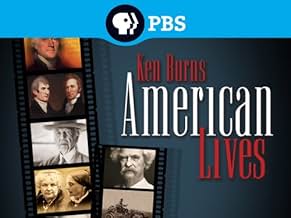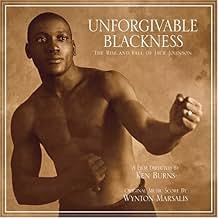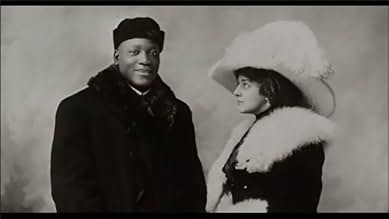AVALIAÇÃO DA IMDb
8,3/10
1,7 mil
SUA AVALIAÇÃO
Adicionar um enredo no seu idiomaThe story of Jack Johnson, the first African-American Heavyweight boxing champion.The story of Jack Johnson, the first African-American Heavyweight boxing champion.The story of Jack Johnson, the first African-American Heavyweight boxing champion.
- Ganhou 3 Primetime Emmys
- 4 vitórias e 5 indicações no total
Jack Johnson
- Self
- (cenas de arquivo)
José Torres
- Self - Former Light Heavyweight Champion
- (as Jose Torres)
W.C. Heinz
- Self - Sportswriter
- (as W. C. Heinz)
Keith David
- Narrator
- (narração)
Samuel L. Jackson
- Jack Johnson
- (narração)
Adam Arkin
- Other Voices
- (narração)
Philip Bosco
- Other Voices
- (narração)
Kevin Conway
- Other Voices
- (narração)
Brian Cox
- Other Voices
- (narração)
John Cullum
- Other Voices
- (narração)
Murphy Guyer
- Other Voices
- (narração)
Enredo
Você sabia?
- CuriosidadesIt is stated that as a young man Johnson would sometimes "ride the rails" to find bouts in other towns.This does not mean buying a train ticket. The rails referred to are the iron foot rails attached to the underneath of boxcars by the sliding doors, that served as a footstep. Attached at the ends, with a crossbar at the center, one would lay down on their back and hold on, with a bedroll or rolled-up clothes serving as a cushion under the back.
- Citações
Jack Johnson: I have found no better way in avoiding race prejudice than to act with people of other races as if prejudice did not exist.
- ConexõesFeatured in Ken Burns: America's Storyteller (2017)
- Trilhas sonorasGhost in the House
Composed and Performed by Wynton Marsalis
Avaliação em destaque
Jack Johnson, the first black heavyweight champion, is usually seen as one of the greatest heavyweights of all time. Ken Burns' "Unforgivable Blackness" paints a picture of Johnson as a great defensive fighter, ranging from his roots in mainly all-black boxing to showing him demonstrating moves to a younger fighter when Johnson was well into middle age. Indeed, Johnson used his defensive skills to beat not only white boxers like ex-champion Jim Jeffries, in the 1910 racially charged championship bout in Las Vegas, but top black boxers like Joe Jeannete, Sam Langford, and Sam McVey. The pumped-up strong boys in today's diffuse heavyweight division look physically fearsome, but I believe Johnson's defensive skills would have made it difficult for anyone to beat him, including Mike Tyson in his prime.
The portrayal of Johnson in the "Boxing's Best" series was excellent, but nearly three hours shorter than this 216-minute documentary. Some of the same footage and photos are in this video, but here we get more footage and far more of other stuff. Shown are footage of Johnson's fights with Jeffries, Tommy Burns (from whom he won the title), Fireman Jim Flynn, Stanley Ketchel, and Frank Moran, and other boxing clips of himself and others. The buildup, aftermath, and social meaning of the Jeffries fight are thorough and thoughtfully done.
White champions since John L. Sullivan in the 1880s had refused to fight black challengers until Johnson defeated Burns. The subsequent efforts at finding a great white hope are shown (although one omission was no mention of the greatest white hope, Luther McCarty, who died during a match and thus never got to fight Johnson). For whites, regaining the championship was important. Another omission was not mentioning that Johnson lost to white boxer Marvin Hart, who then won the title after Jeffries retired (later, Johnson crushed Burns, who had beaten Hart). I am suspicious of some of the decisions given to white boxers over black boxers in those days. Or, was it a legitimate victory? How about a comment, Ken?
What about Johnson the man? Jack Johnson was an individual to himself and to his own desires. He was not someone who, as the first black heavyweight champion, saw himself as a role model for his race and therefore, obliged to behave in a certain fashion, whether it be, say, more defiant than compliant with white standards. He liked to live the high life, dress well, eat well, drive fancy cars and race cars, perform on vaudeville, etc. Originally from Galveston Texas, he is also the Jack Johnson of Europe and Australia and Cuba and Mexico. He was always on the go, whether chasing Tommy Burns all over the earth to pressure him to fight him for the championship or running off to another country because of trumped-up charges of violation of the Mann Act. Much effort was made to produce expansive footage and photography: Ken Burns tried hard and succeeded.
Johnson and white women would not be such a taboo item today, but would narrators concede in private (they do not in narration) that his being such a frequent consort of prostitutes can justifiably be seen as a negative trait anytime? For this and his individualism and flamboyancy, he was detested by whites and also some blacks.
But Johnson did not care. The film briefly mentions some parallels with Muhammad Ali. However, while Ali could be angered, by political and social issues, and by black opponents calling him Cassius Clay, Johnson was just carefree. He laughed at racial abuse given him in the ring. Ironically, after having such a hard time getting a white champion to fight him, Johnson denied black fighters a chance to fight him because white challengers would result in bigger purses (and presented less risk).
The commentators are writers like Gerald Early (who was also on Burns' "Baseball" and "Jazz" documentaries), Stanley Crouch, Jack Newfield, and George Plimpton; Johnson biographer Randy Roberts; boxing expert Bert Sugar; former light heavyweight champion Jose Torres; James Earl Jones (who played Johnson in "The Great White Hope"), and others. One thing that was better about "Unforgivable Blackness" than "Baseball" was that the celebrity non-baseball experts infused some nonsense into the latter (I enjoyed the baseball personalities); here, the commentators consistently add insights and are knowledgeable about boxing.
The portrayal of Johnson in the "Boxing's Best" series was excellent, but nearly three hours shorter than this 216-minute documentary. Some of the same footage and photos are in this video, but here we get more footage and far more of other stuff. Shown are footage of Johnson's fights with Jeffries, Tommy Burns (from whom he won the title), Fireman Jim Flynn, Stanley Ketchel, and Frank Moran, and other boxing clips of himself and others. The buildup, aftermath, and social meaning of the Jeffries fight are thorough and thoughtfully done.
White champions since John L. Sullivan in the 1880s had refused to fight black challengers until Johnson defeated Burns. The subsequent efforts at finding a great white hope are shown (although one omission was no mention of the greatest white hope, Luther McCarty, who died during a match and thus never got to fight Johnson). For whites, regaining the championship was important. Another omission was not mentioning that Johnson lost to white boxer Marvin Hart, who then won the title after Jeffries retired (later, Johnson crushed Burns, who had beaten Hart). I am suspicious of some of the decisions given to white boxers over black boxers in those days. Or, was it a legitimate victory? How about a comment, Ken?
What about Johnson the man? Jack Johnson was an individual to himself and to his own desires. He was not someone who, as the first black heavyweight champion, saw himself as a role model for his race and therefore, obliged to behave in a certain fashion, whether it be, say, more defiant than compliant with white standards. He liked to live the high life, dress well, eat well, drive fancy cars and race cars, perform on vaudeville, etc. Originally from Galveston Texas, he is also the Jack Johnson of Europe and Australia and Cuba and Mexico. He was always on the go, whether chasing Tommy Burns all over the earth to pressure him to fight him for the championship or running off to another country because of trumped-up charges of violation of the Mann Act. Much effort was made to produce expansive footage and photography: Ken Burns tried hard and succeeded.
Johnson and white women would not be such a taboo item today, but would narrators concede in private (they do not in narration) that his being such a frequent consort of prostitutes can justifiably be seen as a negative trait anytime? For this and his individualism and flamboyancy, he was detested by whites and also some blacks.
But Johnson did not care. The film briefly mentions some parallels with Muhammad Ali. However, while Ali could be angered, by political and social issues, and by black opponents calling him Cassius Clay, Johnson was just carefree. He laughed at racial abuse given him in the ring. Ironically, after having such a hard time getting a white champion to fight him, Johnson denied black fighters a chance to fight him because white challengers would result in bigger purses (and presented less risk).
The commentators are writers like Gerald Early (who was also on Burns' "Baseball" and "Jazz" documentaries), Stanley Crouch, Jack Newfield, and George Plimpton; Johnson biographer Randy Roberts; boxing expert Bert Sugar; former light heavyweight champion Jose Torres; James Earl Jones (who played Johnson in "The Great White Hope"), and others. One thing that was better about "Unforgivable Blackness" than "Baseball" was that the celebrity non-baseball experts infused some nonsense into the latter (I enjoyed the baseball personalities); here, the commentators consistently add insights and are knowledgeable about boxing.
- Cineleyenda
- 24 de fev. de 2007
- Link permanente
Principais escolhas
Faça login para avaliar e ver a lista de recomendações personalizadas
- How long is Unforgivable Blackness: The Rise and Fall of Jack Johnson?Fornecido pela Alexa
Detalhes
- Data de lançamento
- País de origem
- Centrais de atendimento oficiais
- Idioma
- Também conhecido como
- Непростительная чернота: Взлеты и падения Джека Джонсона
- Locações de filme
- Minneapolis, Minnesota, EUA(Minnesota)
- Empresas de produção
- Consulte mais créditos da empresa na IMDbPro
- Tempo de duração3 horas 34 minutos
- Cor
- Mixagem de som
- Proporção
- 16 : 9
Contribua para esta página
Sugerir uma alteração ou adicionar conteúdo ausente

Principal brecha
By what name was Unforgivable Blackness: The Rise and Fall of Jack Johnson (2004) officially released in Canada in English?
Responda


















